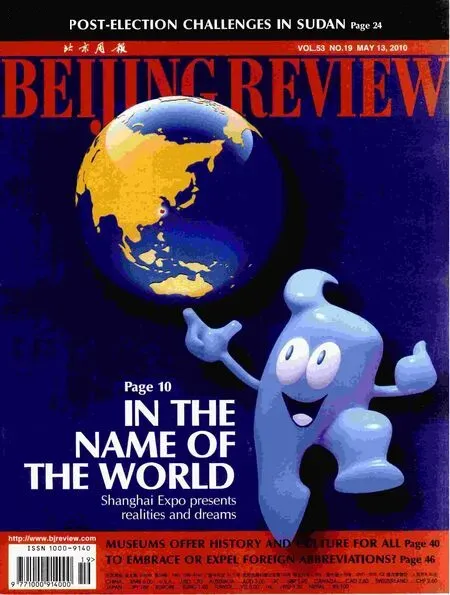A Minor Player in the Global Game
The U.S. Department of Treasury’s decision to postpone its mid-April report labeling China a“currency manipulator” was all but expected. Beijing Review reporters Chen Wen and Liu Yunyun attended a discussion titled “Does China’s Present Currency Valuation Undermine the Global Economy?” held at the Center on U.S.-China Relations of the Asia Society on April 26. At the discussion, Albert Keidel, senior fellow with the Atlantic Council of the United States, argued against the idea that China’s currency policy is damaging the global economy. Edited excerpts follow:

Albert Keidel
If the world were more balanced, what would it look like?
There is the standard view that rich countries should run surpluses and poor countries should run deficits to reflect the flow of capital to poor countries.But the G20, with the exception of the United States, decided in 2005 this approach was not attractive for poor countries.
And it (the view) has ignored the fact that rich countries are influential in creating the world’s primary currency. In recent years,they created that currency—in the U.S. dollar and then the euro—seeing it spill forth in a large demand shock to create a series of surpluses worldwide.
The source of the surpluses was rooted in an expansion of spending power denominated in dollars that fl owed out of the United States and then was used as the basis for more leveraged debt in countries like the UK,Iceland and in weaker regulated economies in the periphery of Europe.
The major driving force in the world economy over the last 15 years has been this dollar-denominated expansion. It wasn’t caused by federal deficits or by U.S. monetary policies, but by deregulation of our financial system that allowed leveraging of up to 50 to 1 and an output of money denominated in dollars that’s flowed not only into our housing market, but into international transactions as well.
Some say China needs a flexible exchange rate. That’s a red herring.
Economists really don’t know what an exchange rate should be. We might say what direction it might be going, but it’s really bad to try to say, “Well, it ought to be at this point.”
Purchasing parity is not a good way to see where it should go, but we can say with great authority that if a country has an open capital account, so that financial flows in the short term can move back and forth with ease, then it cannot have a fi xed exchange rate. If it does have a fi xed exchange rate, money will fl ow in and out based on interest rate differentials and it will loose control of its monetary policy. So it’s a mantra that nobody argues with that China should have a flexible exchange rate, if it has an open capital account. But China doesn’t have an open capital account.
Market forces can determine the valueof something only if the market is allowed to play its full role. But in China’s case, the market is seriously constrained—it doesn’t have open capital flows. It’s hard to say exactly what would happen to the exchange rate if China opened its markets to allow unregulated capital fl ows, but initially there would be this enormous sucking sound, metaphorically speaking, of money leaving China to invest in other parts of the world. What would that do to the exchange rate? It would have to be depreciated dramatically as everybody tries to sell their renminbi (the Chinese currency).So there isn’t a market condition for such a change.

LABELING OR NOT?:The U.S. Treasury Department has postponed its mid-April report to label China a“currency manipulator”
Regarding restrictions on trade, one of the most notorious is America’s restriction on exports of dual use technology for military and consumer use. The United States also disingenuously states∶ “Well it’s not much, so it really wouldn’t matter.” But who knows how much it would be? If the Chinese had been given the opportunity to import more, there may have been more balance.
Exchange rates did not create U.S. consumer debt; but fi nancial de-regulation did.
Imbalances, as many people hold true,were created by the glut of spending on the part of the United States, which then fi ltered to other countries and accumulated in excess.
So what allowed China to have a surplus?China was basically balancing its imports and exports until just after the SARS epidemic in 2003. The nation tried to fi ght the epidemic, which exerted a serious human and social cost on China, by stimulating its economy. As the seriousness of SARS faded,the economy overheated, and in 2005 the Chinese Government restricted investment(to cool down the economy). Machinery imports slowed dramatically. China essentially had this surplus that picked up, not because exports accelerated, but because imports slowed.
In 2008, China allowed its currency to float. By keeping its currency high and appreciating it, China actually did the world a favor. Its policies helped the global economy at its lowest point during the crisis rather than,as termed by some, “stopping its revaluation policy,” which isn’t an accurate description of what was happening anyway.
Currency is a minor player, if a player at all, in damaging the global economy. The real problem is that right now the fi scal policies of the United States and Europe, and those proposed by the IMF, are too conservative.We need to replace the liquidity we lost during the crisis and in the collapse of America’s spending power. But we need to replace it in a safe and sustainable way. ■

